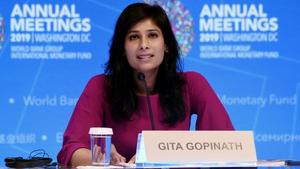 In this Oct 15, 2019 photo, Gita Gopinath, IMF Chief Economist and Director of the Research Department, speaks at a briefing during the IMF and World Bank Fall Meetings in Washington, DC, USA. (OLIVIER DOULIERY / AFP)
In this Oct 15, 2019 photo, Gita Gopinath, IMF Chief Economist and Director of the Research Department, speaks at a briefing during the IMF and World Bank Fall Meetings in Washington, DC, USA. (OLIVIER DOULIERY / AFP)
WASHINGTON - The chief economist of the International Monetary Fund on Tuesday called for coordinated action and greater accountability to ensure that the world meets a target of vaccinating 40 percent of people in every country against COVID-19 by the end of 2021.
India's decision this week to resume vaccine exports was "a very important part of the solution," but major economies also had to ratchet up vaccine deliveries to honor their pledges, Gita Gopinath told Reuters in an interview.
The pandemic has killed nearly five million people across the world, and the International Monetary Fund has warned that highly unequal health prospects - with just two percent of people in low-income countries vaccinated to date - poses "severe risks"
The pandemic has killed nearly five million people across the world, and the IMF has warned that highly unequal health prospects - with just two percent of people in low-income countries vaccinated to date - poses "severe risks".
Gopinath said Group of Seven rich countries had delivered only 14 percent of the total vaccine doses they had promised, but increasing that to 50 percent would provide sufficient doses to reach the global target for 2021.
ALSO READ: IMF nations approve record US$650b to aid virus fight
"It's not enough to make announcements and pledges. You have to come through on it," she said, adding that one of the biggest accomplishments of the COVID-19 summit being organized by US President Joe Biden on Wednesday would be a more systematic way of holding countries accountable.
"I think (ending the pandemic) is still a solvable problem and that it can be done, as long as you can get the countries and the vaccine manufacturers to come together and deliver on these targets," she said.
It was critical to allocate adequate supplies of vaccines, especially to African countries with big deficits, by year's end, even if some shots did not get into people's arms until early next year, she said.
Gopinath and IMF staff economist Ruchir Agarwal in May released a $50 billion proposal that built on efforts by the United Nations, World Health Organization and other groups to end the COVID-19 pandemic by vaccinating at least 40 percent of the population in all countries by the end of 2021.
READ MORE: IMF chief: 'A shot in the arm' fastest way for global recovery
The plan, subsequently endorsed by the WHO, World Trade Organization and World Bank, called for boosting that vaccination rate to at least 60 percent by the first half of 2022.
Biden has challenged world leaders to boost that target to 70 percent by the time of next year's United Nations General Assembly.


